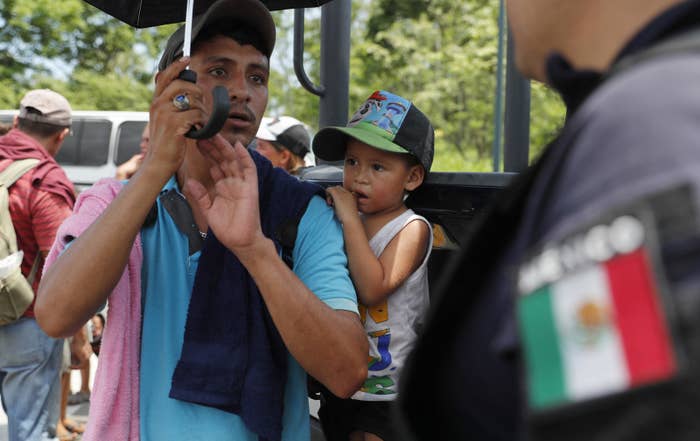
Mexico will take "unprecedented steps" to reduce the flow of migrants attempting to reach the US, including deploying its National Guard to its southern border and dismantling trafficking organizations, as part of a deal reached Friday night to avoid US tariffs on Mexican goods.
The US also said it would expand its Migrant Protection Protocols, or "Remain in Mexico" policy, to the entire southern border, and agreed to speed up hearings for asylum claims, according to a joint US–Mexico statement released by the State Department. The agreement said the US will help with development programs in Central America and southern Mexico to address the root causes of immigration.
The last-minute deal, reached after 12 hours of negotiations Friday, came after President Donald Trump threatened to place a 5% tariff on goods imported from Mexico unless the Mexican government agreed to help stem immigration to the US.
I am pleased to inform you that The United States of America has reached a signed agreement with Mexico. The Tariffs scheduled to be implemented by the U.S. on Monday, against Mexico, are hereby indefinitely suspended. Mexico, in turn, has agreed to take strong measures to....
But the deal fell short of some demands that the Trump administration had hoped to impose on Mexico. Notably absent was a "safe third country" agreement, which would have forced asylum-seekers from Central America to apply for refuge in the first country they arrive in, meaning Mexico.
Mexico's ambassador to the United States, Martha Bárcena, said on Twitter that asylum-seekers forced to wait in Mexico would have access to work permits, education, and health care while their claims were processed in the US.
"The United States looks forward to working alongside Mexico to fulfill these commitments so that we can stem the tide of illegal migration across our southern border and to make our border strong and secure," Secretary of State Mike Pompeo said in a statement.
Mexican President Andrés Manuel López Obrador also touted the agreement as a victory, tweeting minutes after the agreement was reached that tariffs against the country had been avoided.
The Trump administration's Migrant Protection Protocol policy has resulted in thousands of asylum-seekers having to wait in Mexico's border towns for their cases to be adjudicated in the US.
In late May, Mexican immigration officials said more than 6,700 Central Americans had been returned to Mexico as part of the policy, and some asylum-seekers had been given initial US court dates as late as June 2020.
“The Trump administration announced that it intends to further expand its forced return to Mexico policy, which has been illegal since day one and has already proven to be a disaster," Omar Jadwat, director of the ACLU’s Immigrants’ Rights Project, said in a statement Friday night. "We continue to press our legal challenge to the policy.”
As part of the deal, Mexican officials are expected to "take unprecedented steps to increase enforcement to curb irregular migration," according to the statement. Trump has repeatedly accused the Mexican government of doing little to stop immigrants who must travel through Mexico to reach the United States.
"Mexico is also taking decisive action to dismantle human smuggling and trafficking organizations as well as their illicit financial and transportation networks," according to the statement from the State Department.
But migrant rights advocates worry the deal will mean a crackdown on groups that work to protect people who make the dangerous trek north to the United States, and will not be aimed at criminal organizations involved in human trafficking.
On Thursday, while negotiations between Mexico and the US were ongoing, Mexican authorities arrested two migrant caravan organizers, accusing them of transporting people for money.
Pueblo Sin Fronteras, an immigrant rights organization, criticized both the US and Mexico for the arrests, accusing the Mexican government of orchestrating the arrests in order to appease the Trump administration.
"The Mexican government has detained them to present them as trophies before the United States government," the organization said in a statement. "Despite assurances from the Mexican government that tells us that Mexico makes its own migration policy, this series of events makes it clear that's not the case."
According to the State Department, both the US and Mexico can "take further actions" if the agreement does "not have the expected results."
